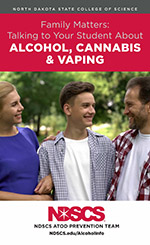Tips to Help Prevent College Substance Misuse
Parental influence remains a powerful factor in college. Many students who choose not to drink do so because their parents discussed alcohol risks and set expectations with them. Here’s how families can support NDSCS students:
- Talk About Alcohol’s Impact: Discuss how drinking can affect their academics, relationships, and safety, as well as the broader impact on the NDSCS community.
- Review NDSCS Policies Together: Make sure students understand NDSCS’s alcohol, tobacco, and other drugs policy and the legal consequences of underage use.
- Stay Engaged Early On: Provide encouragement during the first six weeks of fall semester when students are most vulnerable to risky behaviors.
- Support Campus Prevention Efforts: Encourage your student to participate in NDSCS alcohol-education programs.
- Understand NDSCS’s Notification Policies: Know when the school might contact families about alcohol-related issues.
- Know the Signs: Ensure your student can recognize signs of misuse and overdose. Ensure your student knows how to seek help for themselves or friends.
Click below to read Family Matters
Learn about tips for talking to your student about Alcohol, Cannabis & Nicotine. Click here to download the Family Matters Guide.

Parent's Guide to the Teen Brain
New findings about adolescent brain development have opened up ways of thinking about teen behavior, and offer new insight into how parents can help teens understand the risks of drugs and alcohol. For instance:
- Scientific evidence reveals that the brain isn’t fully mature until about age 25. The younger a person is when they begin using alcohol or other drugs, the more likely they will become dependent on that drug.
- One of the last areas of the brain to develop is the prefrontal cortex, which is responsible for processing information, making judgments, controlling impulses, and foreseeing consequences.
Rethinking Drinking (National Institute of Alcohol Abuse and Alcoholism)
The NIAAA presents evidence-based information about risky drinking patterns, the alcohol content of drinks, and the signs of an alcohol problem, along with information about medications and other resources to help people who choose to cut back or quit drinking. The site also features interactive tools, such as calculators for measuring alcohol calories and drink sizes.
North Dakota Higher Education Consortium for Substance Abuse Prevention
An initiative of the North Dakota University System, advocates for stronger prevention policies, collaborates in campus-community partnerships, and assists members of the consortium to develop assessment-based prevention programs.
**NDSCS ATOD Prevention Team. (2017). NDSCS Alcohol, Tobacco, and Other Drug Survey Report. Wahpeton, ND: ND Higher Education Consortium for Substance Abuse Prevention.
North Dakota Parents LEAD
Parents LEAD is a program designed to be a resource for parents and includes tips for starting the conversation, handling questions from children and suggestions for prevention measures that are effective for children at their individual developmental stages.
Please see the North Dakota Parents LEAD (Listen, Educate, Ask, Discuss) website for more information on how to start this conversation.
